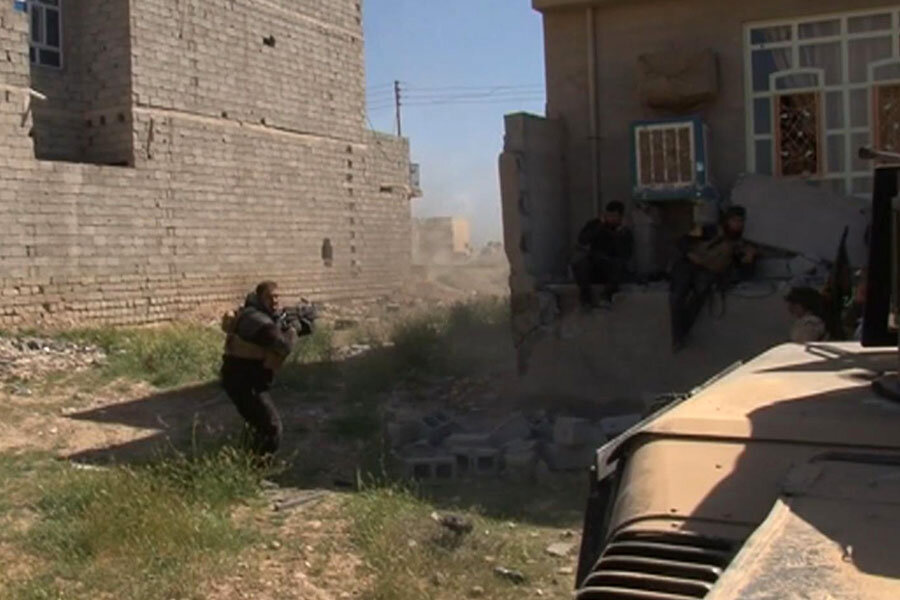Iraqi soldiers, Shiite militia enter Tikrit, officials say
Loading...
| Baghdad
Iraqi soldiers and Shiite militiamen entered the Islamic State-held city of Tikrit on Wednesday, authorities said, breaching one of the biggest strongholds of the extremists in a key test for Iraqi forces.
Explosions and heavy gunfire could be heard as allied Iraqi forces entered the city through its northern Qadisiyya neighborhood, according to video obtained by The Associated Press. Overhead, an attack helicopter fired missiles as soldiers and militiamen laid down heavy machine gunfire in the neighborhood's dusty streets as downtown Tikrit loomed in the distance, black smoke rising overhead.
Officials quickly established a supply line to reinforce troops, Salahuddin police Brig. Kheyon Rasheed told the state-run Iraqiyya television.
"The terrorists are seizing the cars of civilians trying to leave the city and they are trying to make a getaway," Rasheed said. Authorities offered no immediate casualty figures.
A local official in Iraq's Salahuddin province also confirmed that Iraqi troops and the militias made it into Qadisiyya. He spoke on condition of anonymity as he was not authorized to brief journalists.
The Islamic State group holds about a third of Iraq and neighboring Syria in its self-declared caliphate. Tikrit, the capital of Salahuddin province 80 miles north of Baghdad, is one of the largest cities held by Islamic State militants and lies on the road connecting Baghdad to Mosul. Retaking it will give Iraqi forces a major supply link to retake Mosul.
US military officials have that said a coordinated military mission to retake Mosul, Iraq's second-largest city, likely will begin in April or May and involve up to 25,000 Iraqi troops. But the Americans have cautioned that if the Iraqis are not ready, the offensive could be delayed.
On Tuesday, Iraqi forces retook the town of Alam on the outskirts of Tikrit. They also sealed off Tikrit to prepare for an offensive inside the city. Hidden bombs and snipers had slowed the troops' progress.
Iraqi government officials touted the high morale of Iraqi security forces going into the Tikrit operation, particularly after liberating Beiji, home to Iraq's largest refinery, in November. But the battle for Tikrit is likely to involve street-to-street fighting, something Iraqi forces have struggled with in the past. Until recently, Iraqi security forces primarily focused on preventing or responding to insurgent bombings and other attacks.
Iranian military advisers have been helping guide Iraqi forces in their advance on Tikrit. Among those directing operations is Iranian Gen. Qassem Soleimani, commander of the powerful Revolutionary Guard's Quds Force.
Frontline images have emerged of the general in recent days, showing him smiling and marching alongside tanks and ground troops in plainclothes without a bulletproof vest. The overt Iranian role and the prominence of Shiite militias in the campaign have raised fears of possible sectarian cleansing should Tikrit, an overwhelmingly Sunni city, fall to the government troops.
The US says its allied coalition carrying out airstrikes targeting the extremists has not been involved in the ongoing Tikrit offensive. Iraq's Prime Minister Haider al-Abadi has appealed for more aid for his country's beleaguered ground forces, which have struggled to regain territory from the Islamic State group despite seven months of US-led coalition air raids.
The US spent billions of dollars training and equipping Iraq's army during its eight-year occupation, only to see security forces crumble last summer when the Islamic State group swept across northern Iraq.
The Pentagon has requested $1.6 billion from Congress to train and arm Iraqi and Kurdish forces. That includes an estimated $89.3 million in weapons and other equipment to each of Iraq's nine army brigades, according to a Pentagon document prepared in November. A senior US military official told the AP that as of June 2014, the Iraqi military stood at 125,000 men at best, down from 205,000 in January 2014. Iraqi officials said that at least 30,000 men — including the military, militias, Sunni tribes and police — are fighting to capturing Tikrit.
Most battlefield successes in Iraq have been coordinated efforts, with Iraqi and Kurdish forces and Shiite militias fighting on the ground and the US-led coalition providing air power. The siege on the village of Amirli just north of Baghdad, when many feared the capital itself might fall, was broken last year with the help of US-led airstrikes and a fighting force of mainly Shiite militias.
Shiite militiamen backed by a coalition air campaign also retook the town of Jurf al-Sukhr, on Baghdad's outskirts, from the militants in October.





